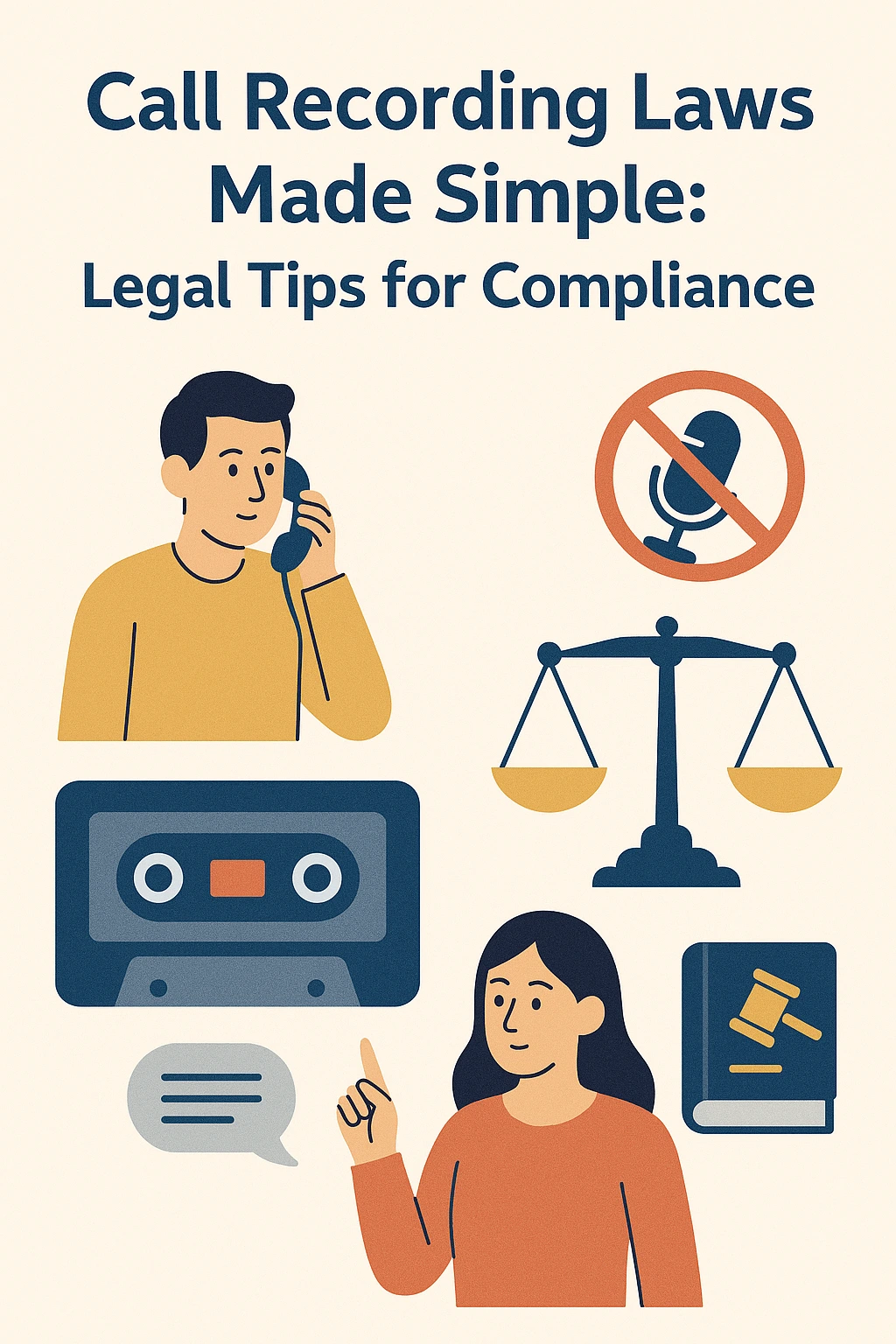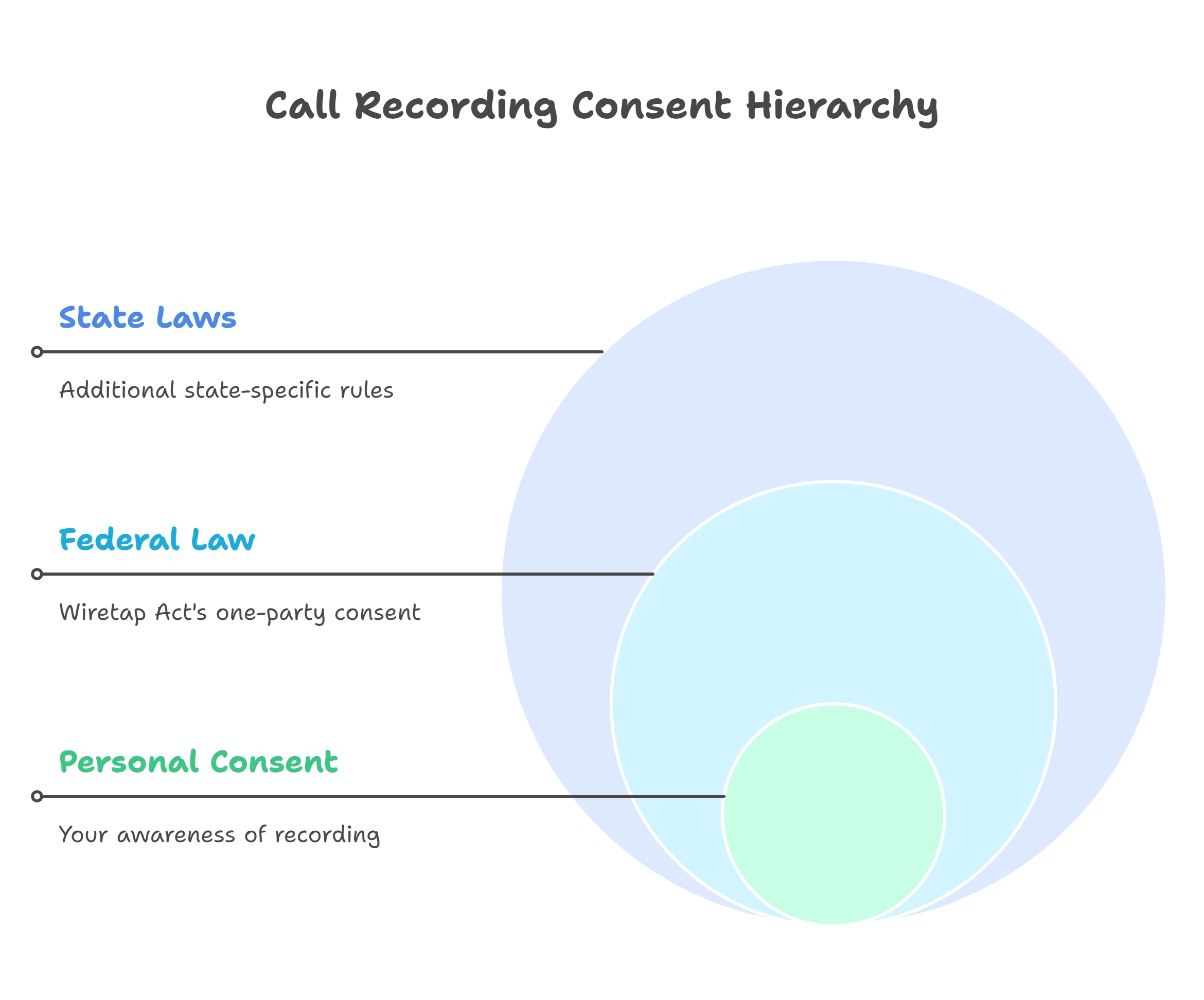
Call Recording Laws Made Simple: Legal Tips for Compliance
Summary:
Recording business calls can be incredibly useful for training, compliance, and customer service, but the laws around it are tricky. Some states only need one person’s consent, while others require everyone on the line to agree. If you get it wrong, the consequences can be more than just fines; it can damage customer trust. This blog breaks down call recording laws in plain English and shares five practical tips to help you stay compliant while still reaping the benefits of recording.
Call recording is common in sales, support, and customer service, but the legal rules can be confusing. This blog explains call recording laws in simple terms, breaks down the difference between one-party and two-party consent, and shares five clear tips to record calls legally. You’ll also learn why compliance matters for building trust, protecting your business, and keeping customer data safe.

The first time I set up a call recording system for a sales team, I thought it would be easy. Plug it in, hit record, done. But almost immediately, someone asked me: “Wait… is this even legal?”
That question stopped me in my tracks. I knew call recordings were common; you hear “This call may be recorded” almost daily. But I realized most of us don’t actually know what the law says. And here’s the tricky part: call recording laws aren’t the same everywhere.
What’s legal in Texas might land you in trouble in California. A sales rep calling across state lines can trigger different rules without even realizing it.
That’s why I’m writing this guide. By the end, you’ll know the basics of call recording compliance, why it matters, and five simple, practical tips to keep your business out of trouble.
Understanding Call Recording Laws

Before we talk about tips, let’s get the basics straight. There are two layers of law you need to worry about: federal and state.
Federal Call Recording Laws in the U.S.
At the federal level, the Wiretap Act is what matters most. It sets the rule that the U.S. follows one-party consent. That means if you’re part of the call, you can legally record it without telling the other person.
So, if I call my business partner and hit “record,” I'm already satisfied with federal law because I knew about it.
Sounds simple enough, right? Unfortunately, that’s just the starting point.
State-Specific Call Recording Laws
This is where things get complicated. States are allowed to create stricter rules, and some of them do.
One-Party Consent States
Most states stick with the federal model. New York, Texas, and Illinois, in these places, as long as one person on the call knows it’s being recorded, it’s legal.
For example, if a customer service rep in New York records a call for training purposes, they’re fine under state law even if the caller never hears a disclosure. But, and this is important, “legal” doesn’t always mean “smart.” Customers often appreciate being told up front, and it avoids any appearance of secrecy.
Two-Party (All-Party) Consent States
A handful of states, like California, Pennsylvania, Florida, and Washington, are stricter. In these states, you need everyone’s consent before recording. That means if you don’t disclose, you’re breaking the law, even if you’re one of the callers.
Here’s a real case: A California company recorded customer support calls without telling people. They weren’t trying to be sneaky; they just wanted training material. Still, the courts hit them with millions in penalties.
Lesson learned: in two-party consent states, you can’t afford to skip disclosure.
Business vs Personal Call Recording
The rules apply to everyone, but businesses face extra pressure.
- Personal use: If you record a private call with a friend in a one-party consent state, you’re usually fine as long as you’re in the conversation.
- Business use: If your company records hundreds of customer calls, regulators expect call recording consent, secure storage, and clear policies. Mishandling those recordings doesn’t just raise legal issues; it erodes trust.
Why Call Recording Compliance Matters
Let’s be honest: most businesses don’t think about call recording compliance until something goes wrong. A customer complains, a lawyer gets involved, or suddenly there’s a fine you didn’t see coming. And by then, it’s too late.
Here’s the reality: recording calls isn’t just a technical task. It’s a trust issue. When a customer picks up the phone, they expect a fair conversation. If they later discover you were recording without asking, it doesn’t matter if the law allowed it in your state; to them, it feels sneaky. And people don’t forget that kind of thing.
I once spoke with a sales manager who thought one-party consent covered his team across the board. They had reps dialing customers in California without proper disclosure. A single complaint turned into an expensive lesson because California is an all-party consent state. The fine hurt, but what stung more was the hit to their brand. Customers started second-guessing whether they could trust the company at all.
That’s why compliance matters. It’s not just about staying on the safe side of federal vs. state recording laws; it’s about showing customers that their words, their data, and their privacy matter to you. In an age where every company claims to care about “customer experience,” this is one of the simplest, most powerful ways to prove it.
- Avoiding Lawsuits and Fines
Courts don’t care about intent. Even if you only recorded for “quality assurance,” failing to follow the law can cost you big. - Building Customer Trust
People don’t usually mind being recorded if you’re honest about it. A simple disclosure like “This call may be recorded” actually builds credibility. - Ethical Data Handling
Call recordings often include sensitive details: credit card numbers, addresses, and medical info. Compliance isn’t just about the law; it’s about protecting people’s privacy.
5 Tips to Legally Record Calls
Now let’s get into the practical side. Here are five tips I recommend to every business I work with.
Tip 1: Always Disclose Recording
Don’t leave it up to chance. Begin every recorded call with a clear notice. Something as simple as:
“Just so you know, this call may be recorded for training and quality purposes.”
It’s short, professional, and keeps you protected.
Tip 2: Get Clear Consent (Verbal or Written)
In two-party consent states, you need more than disclosure; you need agreement. That can be verbal (“Yes, that’s fine”) or written (in your service contract).
If the person objects, don’t record. Simple as that.
Tip 3: Use Secure Call Recording Software
I’ve seen companies make the mistake of storing recordings on open drives or unencrypted servers. That’s an accident waiting to happen.
A tool like PowerDialer.ai makes this easy. It not only handles call recording compliance automatically but also stores files securely and limits access. That way, you don’t have to worry about leaks or mishandling.
Tip 4: Follow Both Federal and State Laws
Here’s the tricky part: If you’re in Texas (one-party) and you call a customer in California (two-party), which law applies? The stricter one. Always assume the highest standard applies.
Think of it like driving. If the speed limit drops from 70 to 55 when you cross into another state, you have to slow down.
Tip 5: Store Recordings Safely and Limit Access
Compliance doesn’t stop when the call ends. Recordings should be encrypted, access should be restricted, and you should have a policy for how long they’re kept.
I once worked with a company that saved every call “forever” because no one thought to delete them. Not only was that a storage nightmare, it was a liability. Keep only what you need.
Call Recording Best Practices for Businesses
Beyond staying legal, smart businesses treat recording as part of their overall customer experience.
- Train your employees: Don’t assume reps know the laws. Regular training reduces mistakes.
- Automate compliance: Relying on humans to remember every disclosure is risky. Automated tools help.
- Audit regularly: Laws change, and so should your policies. Review them at least once a year.
These call recording best practices aren’t just about avoiding fines; they make your company look professional and trustworthy.
Conclusion
Recording calls can be a huge benefit for training, resolving disputes, and protecting your business. But without following call recording laws, it can also become a liability.
The rules may seem complicated, but the formula is simple: disclose, get consent, use secure tools, and follow the strictest standard.
In the long run, compliance isn’t just about avoiding penalties; it’s about showing respect for your customers and protecting your business.
Want an easier way to stay compliant? PowerDialer.ai takes the guesswork out of call recording. With built-in consent prompts, secure storage, and compliance automation, it keeps your business safe while letting your team focus on selling.
Book a demo with PowerDialer.ai today and see how simple legal compliance can be.
FAQs
Q1. Is it legal to record phone calls without consent?
No. Most states require at least one-party consent, and some require all-party consent.
Q2. What’s the difference between one-party and two-party consent?
One-party means only one person in the conversation has to agree. Two-party means everyone must consent.
Q3. Can businesses record calls for training purposes?
Yes, but they must disclose and get consent.
Q4. Do call recording laws apply to video calls?
Yes. If audio is being recorded, the same laws apply.
Q5. How can I make sure my business stays compliant?
Use software with built-in compliance features, train your staff, and always disclose recordings.
